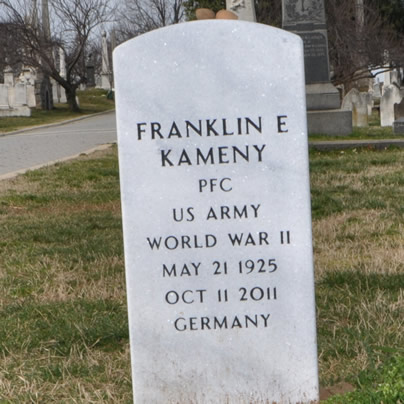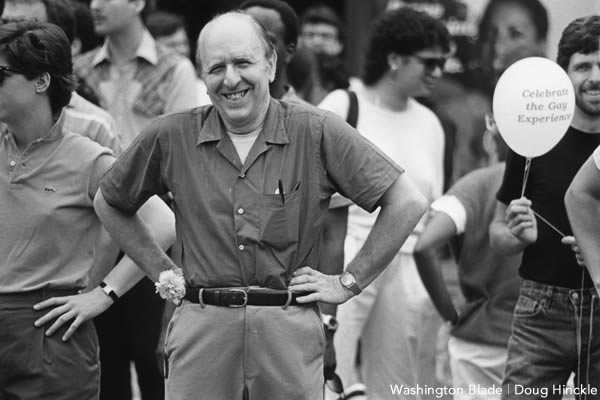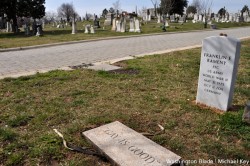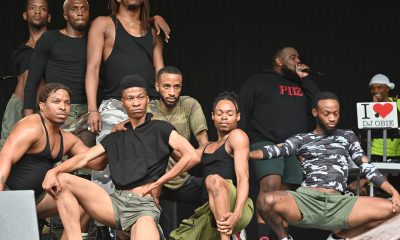Local
1 year later, Kameny’s ashes still not buried
Dispute over burial site remains unresolved


Pioneering gay rights activist, Frank Kameny died on Oct. 11, 2011, which happens to be National Coming Out Day. (Washington Blade photo by Doug Hinckle)
One year after gay rights pioneer Frank Kameny’s death in his Washington home at the age of 86, LGBT advocates said they would remember his legacy as they celebrate National Coming Out Day this week.
Kameny died of natural causes on Oct. 11, 2011, the day LGBT advocates have designated as National Coming Out Day.
His friends and admirers, while saddened by his loss, said it was befitting that Kameny departed on a day commemorating an action he may have been among the first to take part in in the late 1950s — a proud and open declaration that one is gay, lesbian, bisexual or transgender.
“His accomplishments for our community are immeasurable,” said veteran D.C. gay activist Paul Kuntzler
Kuntzler spoke to the Blade about Kameny during a candidate endorsement forum Tuesday night sponsored by the Gertrude Stein Democratic Club, an LGBT organization that Kuntzler and Kameny helped found in January 1976.
But Kuntzler and others who worked with Kameny said they remain troubled that an ongoing dispute between Timothy Clark, the heir and personal representative to Kameny’s estate, and the D.C. gay charitable group Helping Our Brothers and Sisters (HOBS) has resulted in the indefinite postponement of the burial of Kameny’s ashes.

A headstone once marked the the spot where advocates intended gay activist Frank Kameny to be buried, but legal action has halted the interment and the headstone has been removed. (Washington Blade file photo by Michael Key)
In August, an official with D.C.’s historic Congressional Cemetery, where Kameny’s ashes were to be buried, said an urn bearing the ashes remained in a storage vault at the cemetery’s headquarters near Capitol Hill while the estate dispute dragged on.
When asked if the ashes were still in storage at the cemetery, Congressional Cemetery President Paul Williams told the Blade on Wednesday, “There has been no substantial change in the case. That’s all I’m going to say.”
Both sides acknowledge that the dispute is over a disagreement about how to transfer the ownership of the cemetery plot from HOBS, which bought it earlier this year, to the Kameny estate, which is under the control of Clark.
HOBS executive director Marvin Carter has said HOBS is willing to sell the plot to the estate at the price the group paid for it earlier this year. The estate, through one of its attorneys, Glen Ackerman, has said HOBS bought the plot through donations from members of the LGBT community who knew and admired Kameny and that HOBS should transfer the title to the plot to the estate.
Earlier this year, Ackerman said Clark was troubled that some of Kameny’s longtime friends worked with HOBS to buy the plot and make arrangements for the burial without consulting Clark, who has legal authority over the ashes. Ackerman said then that Clark was concerned that HOBS might seek to bury others in the plot along with Kameny’s ashes since the plot can accommodate at least two coffins and three urns.
HOBS has said it has no intention of burying anyone else in the plot.
“The estate of Franklin Kameny is currently in negotiations in an effort to settle outstanding matters related to the estate,” Ackerman said in a statement released on Tuesday. “We cannot comment on these negotiations or the status of the various matters as doing so may compromise the progress that has been made thus far,” he said. “All involved are hopeful that resolution may be reached in the near future.”
“HOBS is working diligently and in good faith to resolve all issues concerning the plot at Congressional Cemetery and the final burial of Frank’s ashes at the Cemetery in a manner and under circumstances that will protect and advance Frank’s reputation in and contributions to the LGBT community,” Carter said in a statement issued to the Blade.
Records in the D.C. Superior Court’s civil division, where the Kameny estate case remains pending, show that at least one creditor filed suit against the estate on Aug. 7 to challenge a decision by the estate to reject the creditor’s request for repayment of a $12,000 loan and $3,075 of accrued interest on the loan for a total of $15,075.
The suit says the loan was made by D.C. gay activist and longtime Kameny friend Craig Howell in two increments in 2003 and 2004, according to Mindy Daniels, Howell’s attorney.
Court papers filed by the estate challenge the legal authority of Howell’s claim for the loan repayment on several grounds, saying, among other things, that Howell waived a requirement that Kameny make interest payments on the loan prior to Kameny’s death.
The Human Rights Campaign, a national LGBT political group that organizes Coming Out Day activities, included a remembrance of Kameny on its website this week.
“One year ago, the LGBT community lost equality pioneer Frank Kameny, a man whose tireless activism blazed a trail for the entire LGBT community,” the HRC web posting says. “This National Coming Out Day, we remember Frank Kameny by honoring his legacy as a forerunner of the modern LGBT rights movement.”
Kameny, a D.C. resident since the 1950s, is credited with playing a key role in laying the foundation for the modern gay rights movement beginning in the early 1960s, nearly a decade before the 1969 Stonewall riots in New York’s Greenwich Village.
He began his fight for LGBT equality in 1957 after being fired for being gay from his job as an astronomer at the U.S. Army Map Service. After losing administrative and lower court appeals, Kameny took his case to the U.S. Supreme Court, where he wrote his own petition urging the high court to hear the case in 1961.
The Supreme Court denied his petition and left standing a lower court ruling upholding his firing. But LGBT advocates and historians have said Kameny’s petition, or brief, filed with the high court represented the first known time anyone submitted an unapologetic and legally reasoned argument before a court of law in support of equal rights for gay people in the United States.
A short time later, Kameny co-founded the Mattachine Society of Washington, the city’s first gay rights organization. Although Mattachine Society groups had formed in other cities beginning in the 1950s, the D.C. group under Kameny’s leadership took on a far more assertive posture in pushing for gay equality, laying the groundwork for the post-Stonewall Riots LGBT rights movement in the years ahead, according to author David Carter, who is currently writing a Kameny biography.
Maryland
Rockville teen charged with plotting school shooting after FBI finds ‘manifesto’
Alex Ye charged with threats of mass violence

BY BRETT BARROUQUERE | A Montgomery County high school student is charged with what police describe as plans to commit a school shooting.
Andrea Ye, 18, of Rockville, whose preferred name is Alex Ye, is charged with threats of mass violence. Montgomery County Police and the FBI arrested Ye Wednesday.
The rest of this article can be found on the Baltimore Banner’s website.
District of Columbia
New D.C. LGBTQ+ bar Crush set to open April 19
An ‘all-inclusive entertainment haven,’ with dance floor, roof deck

D.C.’s newest LGBTQ+ bar called Crush is scheduled to open for business at 4 p.m. on Friday, April 19, in a spacious, two-story building with a dance floor and roof deck at 2007 14th St., N.W. in one of the city’s bustling nightlife areas.
A statement released by co-owners Stephen Rutgers and Mark Rutstein earlier this year says the new bar will provide an atmosphere that blends “nostalgia with contemporary nightlife” in a building that was home to a popular music store and radio supply shop.
Rutgers said the opening comes one day after Crush received final approval of its liquor license that was transferred from the Owl Room, a bar that operated in the same building before closing Dec. 31 of last year. The official opening also comes three days after Crush hosted a pre-opening reception for family, friends, and community members on Tuesday, April 16.
Among those attending, Rutgers said, were officials with several prominent local LGBTQ organizations, including officials with the DC Center for the LGBTQ Community, which is located across the street from Crush in the city’s Reeves Center municipal building. Also attending were Japer Bowles, director of the Mayor’s Office of LGBTQ Affairs, and Salah Czapary, director of the Mayor’s Office of Nightlife and Culture.
Rutgers said Crush plans to hold a grand opening event in a few weeks after he, Rutstein and the bar’s employees become settled into their newly opened operations.
“Step into a venue where inclusivity isn’t just a promise but a vibrant reality,” a statement posted on the Crush website says. “Imagine an all-inclusive entertainment haven where diversity isn’t just celebrated, it’s embraced as the very heartbeat of our venue,” the statement says. “Welcome to a place where love knows no bounds, and the only color or preference that matters is the vibrant tapestry of humanity itself. Welcome to Crush.”
The website says Crush will be open Tuesdays and Wednesdays from 4 p.m. to 12 a.m., Thursdays from 4 p.m. to 2 a.m., Fridays from 4 p.m. to 3 a.m., Saturdays from 2 p.m. to 3 a.m., and Sundays from 2 p.m. to 12 a.m. It will be closed on Mondays.
Crush is located less than two blocks from the U Street Metro station.
District of Columbia
Reenactment of first gay rights picket at White House draws interest of tourists
LGBTQ activists carry signs from historic 1965 protest

About 30 LGBTQ activists formed a circular picket line in front of the White House Wednesday afternoon, April 17, carrying signs calling for an end to discrimination against “homosexuals” in a reenactment of the first gay rights protest at the White House that took place 59 years earlier on April 17, 1965.
Crowds of tourists looked on with interest as the activists walked back and forth in silence in front of the White House fence on Pennsylvania Avenue. Like the 1965 event, several of the men were dressed in suits and ties and the women in dresses in keeping with a 1960s era dress code policy for protests of the Mattachine Society of Washington, D.C., the city’s first gay rights group that organized the 1965 event.
Wednesday’s reenactment was organized by D.C.’s Rainbow History Project, which made it clear that the event was not intended as a protest against President Joe Biden and his administration, which the group praised as a strong supporter of LGBTQ rights.
“I think this was an amazing event,” said Vincent Slatt, the Rainbow History Project official who led efforts to put on the event. “We had twice as many that we had hoped for that came today,” he said.
“It was so great to see a reenactment and so great to see how far we’ve come,” Slatt said. “And also, the acknowledgement of what else we still need to do.”
Slatt said participants in the event who were not carrying picket signs handed out literature explaining the purpose of the event.
A flier handed out by participants noted that among the demands of the protesters at the 1965 event were to end the ban on homosexuals from working in the federal government, an end to the ban on gays serving in the military, an end to the denial of security clearances for gays, and an end of the government’s refusal to meet with the LGBTQ community.
“The other thing that I think is really, really moving is some of the gay staff inside the White House found out this was happening and came out to greet us,” Slatt said. He noted that this highlighted how much has changed since 1965, when then President Lyndon Johnson’s White House refused to respond to a letter sent to Johnson from the Mattachine Society explaining its grievances.
“So now to have gay people in the White House coming out to give us their respects and to say hello was especially meaningful to us,” Slatt said. “That was not expected today.”
Among those walking the picket line was longtime D.C. LGBTQ rights advocate Paul Kuntzler, who is the only known surviving person who was among the White House picketers at the April 1965 event. Kuntzler said he proudly carried a newly printed version of the sign at Wednesday’s reenactment event that he carried during the 1965 protest. It stated, “Fifteen Million Homosexuals Protest Federal Treatment.”
Also participating in the event was Japer Bowles, director of D.C. Mayor Muriel Bowser’s Office of LGBTQ Affairs. Bowles presented Slatt with a proclamation issued by Bowser declaring April 17, 2024, Mattachine Society Day in Washington, D.C.
“Whereas, on April 17, 1965, the Mattachine Society of Washington courageously held the nation’s inaugural picket for gay rights, a seminal moment in the ongoing struggle for LGBTQIA+ equality in the United States, marking the genesis of public demonstrations advocating for those rights and paving the way for Pride Marches and Pride celebrations worldwide,” the proclamation states.
About 30 minutes after the reenactment event began, uniformed Secret Service agents informed Slatt that due to a security issue the picketers would have to move off the sidewalk in front of the White House and resume the picketing across the street on the sidewalk in front of Lafayette Park. When asked by the Washington Blade what the security issue was about, one of the Secret Service officers said he did not have any further details other than that his superiors informed him that the White House sidewalk would have to be temporarily cleared of all people.
Participants in the event quickly resumed their picket line on the sidewalk in front of Lafayette Park for another 30 minutes or so in keeping with the 1965 picketing event, which lasted for one hour, from 4:20 p.m. to 5:20 p.m., according to Rainbow History Project’s research into the 1965 event.
Although the LGBTQ picketers continued their procession in silence, a separate protest in Lafayette Park a short distance from the LGBTQ picketers included speakers shouting through amplified speakers. The protest was against the government of Saudi Arabia and organized by a Muslim group called Al Baqee Organization.
A statement released by the Rainbow History Project says the reenactment event, among other things, was a tribute to D.C.-area lesbian rights advocate Lilli Vincenz, who participated in the 1965 White House picketing, and D.C. gay rights pioneer Frank Kameny, who founded the Mattachine Society of Washington in the early 1960s and was the lead organizer of the 1965 White House protest. Kameny died in 2011 and Vincenz died in 2023.
The picket signs carried by participants in the reenactment event, which were reproduced from the 1965 event, had these messages:
• “DISCRIMINATION Against Homosexuals is as immoral as Discrimination Against Negroes and Jews;”
• “Government Should Combat Prejudice NOT PROMOTE IT”
• “White House Refuses Replies to Our Letters, AFRAID OF US?
• “HOMOSEXUALS Died for their Country, Too”
• “First Class Citizenship for HOMOSEXUALS”
• “Sexual Preference is Irrelevant to Employment”
• “Fifteen Million U.S. Homosexuals Protest Federal Treatment”
-

 Africa4 days ago
Africa4 days agoCongolese lawmaker introduces anti-homosexuality bill
-

 District of Columbia1 day ago
District of Columbia1 day agoReenactment of first gay rights picket at White House draws interest of tourists
-

 World4 days ago
World4 days agoOut in the World: LGBTQ news from Europe and Asia
-

 Arizona1 day ago
Arizona1 day agoAriz. governor vetoes anti-transgender, Ten Commandments bill










